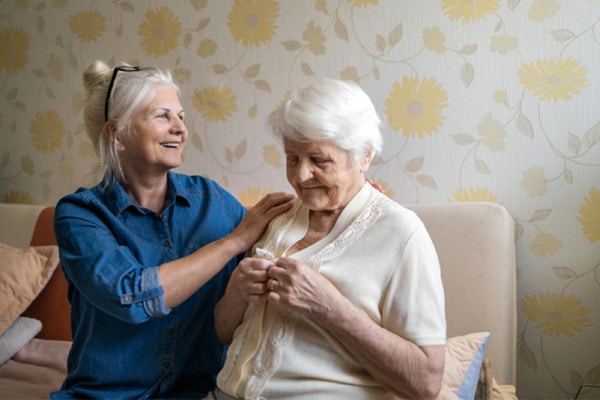A diagnosis of Alzheimer’s disease or another form of dementia is likely to raise a variety of questions and bring about numerous emotions for both the individual diagnosed and his or her family. While life will change, there are a number of steps to take that can help ensure a practical plan is in place that helps a loved one live with dignity and independence and family caregivers receive needed support.
To help families navigate a new Alzheimer’s diagnosis, the Florida care experts at American, Advocate and Whitsyms In-Home Care offer the following tips.
Get Organized
Following an Alzheimer’s diagnosis, it is extremely important to tackle and organize the administrative tasks that will guide an older adult’s care. Gathering information and having it readily available will provide an important measure of control and stability.
- Finances. Discuss with a newly diagnosed loved one the importance of designating a financial power of attorney who can help manage investments, savings accounts, and insurance policies. Now is also an ideal time to have a frank discussion about the older adult’s financial situation, the options available to fund future care needs, and any loans or debts they have.
- Record-Keeping. Use binders to gather and store financial records, medical records, names and contact information for the attorney, investment advisor, CPA, or other professionals. Additionally, ask the older adult to provide the names and contact information for anyone who is important to them.
- Calendar. To help the older adult continue to maintain independence for as long as possible, set up a physical calendar and use it to record the dates and times of medical appointments, social visits with family and friends, support group meetings, etc. Encouraging the older adult to keep a pocket-sized notebook to write down notes, details from conversations, and other information they want to remember is also helpful.
Educate Yourself
For family caregivers, it is easy to feel overwhelmed not just by a loved one’s diagnosis, but by the many changes that can be anticipated as the disease progresses. Maintain a one-day-at-a-time approach and look for reliable resources that can help you plan and prepare, such as:
- Ask the physician for resources that explain what to expect following an Alzheimer’s diagnosis
- Seek out support groups – either local groups that meet in person, or groups that meet virtually
- Access the resources available online at The Alzheimer’s Association, the National Institute on Aging, and other well-regarded organizations
- Ask for referrals to local organizations that help families and their loved one following an Alzheimer’s diagnosis
Build a Support Team
Caring for a loved one with Alzheimer’s is a great deal of responsibility, and it is not a role to take on without support. Building a trusted care team is critical and can help provide support, strategies for care, resources, and insight into what to expect during each stage of the disease.
Primary Care Physician. A trusted physician who has experience managing memory care issues and who is willing to patiently answer questions is critical. In addition to helping to manage the dementia, the physician will also continue to monitor the older adult for other pre-existing health conditions as well as any new health concerns that may arise.
Memory Care Specialist. Following an Alzheimer’s diagnosis, it is important to make an appointment with a physician who specializes in caring for older adults with dementia. This may be a geriatrician, a neurologist and /or a psychiatrist. The knowledge and expertise offered by a specialist can help guide care and provide information about clinical trials.
Geriatric Care Specialists. Social workers, care coordinators and case managers have experience and special training in working with older adults who have been diagnosed with Alzheimer’s. They can help develop a customized care plan and provide practical advice in navigating the stages of the disease, while helping the older adult maintain a high quality of life.
Home Health Care. Partnering with a referred care provider from American, Advocate and Whitsyms In-Home Care is beneficial for both the older adult and the family caregiver. With specialized Alzheimer’s and dementia training, the providers we refer offer friendly companionship, medication management, assistance with personal care needs, and respite care to ensure family caregivers can take needed time away to rest and recharge.
Family and Friends. Having the support and family and friends is critical when navigating an Alzheimer’s diagnosis. From sharing care responsibilities to providing a shoulder to lean on for support, maintaining connections to family and friends is critical for both the older adult and the family caregiver.
American, Advocate and Whitsyms In-Home Care have been trusted by Florida families for over three decades. To learn more about how experienced, friendly, and high-trained referred care providers can help following an Alzheimer’s diagnosis, reach out to the office nearest you to learn about our wide-variety of in-home care services:
- American In-Home Care – Serving North, Central, and West Coast of Florida
- Advocate In-Home Care – Serving Southeast and Southwest Florida
- Whitsyms In-Home Care – Serving Southeast and Southwest Florida
State of Florida License and Registration Numbers: 30211518, 30211651, 30211295, 30211390, 30210978, 30211293, 30211382, 30211504, 30211733, 30211535, 30211531, 30211710, 30211709, 30211045, 5661


